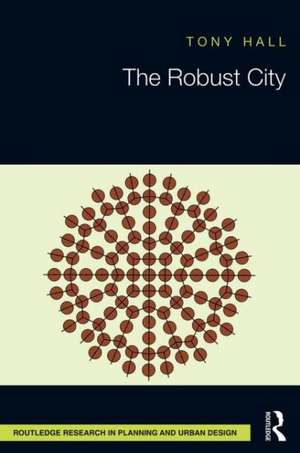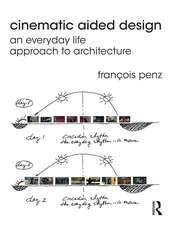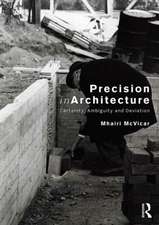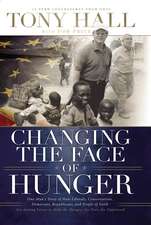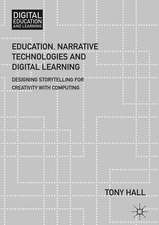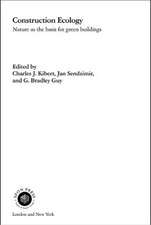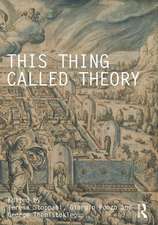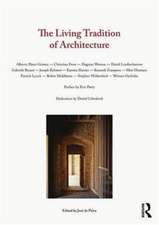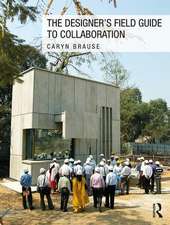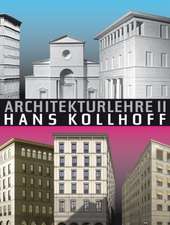The Robust City: Routledge Research in Planning and Urban Design
Autor Tony Hallen Limba Engleză Hardback – 14 apr 2015
The Robust City argues that a robust, expandable and sustainable urban form can be deduced from planning goals. Development should not just follow public transport corridors but should not be allowed beyond walking distance from them. This would create 'green enclaves' that would permit not only recreational access but also the retrofitting of infrastructure and the efficient circulation of motor vehicles. The same principles could also be applied within neighbourhoods and to facilitate the rational handling of urban intensification.
| Toate formatele și edițiile | Preț | Express |
|---|---|---|
| Paperback (1) | 284.52 lei 6-8 săpt. | |
| Taylor & Francis – 22 dec 2016 | 284.52 lei 6-8 săpt. | |
| Hardback (1) | 724.83 lei 6-8 săpt. | |
| Taylor & Francis – 14 apr 2015 | 724.83 lei 6-8 săpt. |
Din seria Routledge Research in Planning and Urban Design
-
 Preț: 327.98 lei
Preț: 327.98 lei -
 Preț: 292.40 lei
Preț: 292.40 lei -
 Preț: 294.82 lei
Preț: 294.82 lei -
 Preț: 311.41 lei
Preț: 311.41 lei -
 Preț: 154.17 lei
Preț: 154.17 lei -
 Preț: 348.21 lei
Preț: 348.21 lei -
 Preț: 311.41 lei
Preț: 311.41 lei -
 Preț: 317.06 lei
Preț: 317.06 lei -
 Preț: 340.99 lei
Preț: 340.99 lei - 31%
 Preț: 763.39 lei
Preț: 763.39 lei - 31%
 Preț: 764.20 lei
Preț: 764.20 lei - 26%
 Preț: 875.97 lei
Preț: 875.97 lei - 26%
 Preț: 846.50 lei
Preț: 846.50 lei - 18%
 Preț: 1005.01 lei
Preț: 1005.01 lei - 18%
 Preț: 1216.52 lei
Preț: 1216.52 lei - 14%
 Preț: 338.33 lei
Preț: 338.33 lei -
 Preț: 284.52 lei
Preț: 284.52 lei -
 Preț: 469.34 lei
Preț: 469.34 lei -
 Preț: 489.26 lei
Preț: 489.26 lei -
 Preț: 449.41 lei
Preț: 449.41 lei - 28%
 Preț: 823.59 lei
Preț: 823.59 lei -
 Preț: 449.41 lei
Preț: 449.41 lei - 25%
 Preț: 569.79 lei
Preț: 569.79 lei - 25%
 Preț: 767.88 lei
Preț: 767.88 lei - 24%
 Preț: 324.16 lei
Preț: 324.16 lei - 18%
 Preț: 1106.02 lei
Preț: 1106.02 lei - 26%
 Preț: 766.10 lei
Preț: 766.10 lei - 18%
 Preț: 1161.28 lei
Preț: 1161.28 lei - 18%
 Preț: 1000.27 lei
Preț: 1000.27 lei - 26%
 Preț: 819.91 lei
Preț: 819.91 lei - 18%
 Preț: 1000.13 lei
Preț: 1000.13 lei -
 Preț: 436.14 lei
Preț: 436.14 lei - 18%
 Preț: 1001.24 lei
Preț: 1001.24 lei - 27%
 Preț: 554.64 lei
Preț: 554.64 lei - 26%
 Preț: 764.20 lei
Preț: 764.20 lei - 28%
 Preț: 822.76 lei
Preț: 822.76 lei - 18%
 Preț: 1160.32 lei
Preț: 1160.32 lei - 18%
 Preț: 1000.76 lei
Preț: 1000.76 lei - 28%
 Preț: 847.34 lei
Preț: 847.34 lei - 25%
 Preț: 852.63 lei
Preț: 852.63 lei - 18%
 Preț: 1169.16 lei
Preț: 1169.16 lei - 18%
 Preț: 1111.90 lei
Preț: 1111.90 lei - 18%
 Preț: 1107.61 lei
Preț: 1107.61 lei
Preț: 724.83 lei
Preț vechi: 883.93 lei
-18% Nou
Puncte Express: 1087
Preț estimativ în valută:
138.71€ • 150.62$ • 116.52£
138.71€ • 150.62$ • 116.52£
Carte tipărită la comandă
Livrare economică 22 aprilie-06 mai
Preluare comenzi: 021 569.72.76
Specificații
ISBN-13: 9781138801325
ISBN-10: 1138801321
Pagini: 174
Ilustrații: 3 black & white tables, 7 black & white halftones, 41 black & white line drawings
Dimensiuni: 156 x 234 x 15 mm
Greutate: 0.36 kg
Ediția:1
Editura: Taylor & Francis
Colecția Routledge
Seria Routledge Research in Planning and Urban Design
Locul publicării:Oxford, United Kingdom
ISBN-10: 1138801321
Pagini: 174
Ilustrații: 3 black & white tables, 7 black & white halftones, 41 black & white line drawings
Dimensiuni: 156 x 234 x 15 mm
Greutate: 0.36 kg
Ediția:1
Editura: Taylor & Francis
Colecția Routledge
Seria Routledge Research in Planning and Urban Design
Locul publicării:Oxford, United Kingdom
Public țintă
PostgraduateCuprins
Preface, Introduction, 1. The Persistence of Form, 2. What Shall We Do with the Private Motor Vehicle? 3. Cities Have Not Been Designed for Expansion, 4. Deriving Form – A Goal-Driven Approach, 5. Deriving Form – A Robust Typology, 6. Beads on a String, 7. A Model for a New City, 8. Application to City Expansion and Intensification, 9. Implications for Development Plans, Conclusion
Notă biografică
Tony Hall is an Adjunct Professor within the Urban Research Program at Griffith University, Brisbane, Australia. Since his move to Australia in 2004, he has published a number of significant works on sustainable urban form, including his 2010 book on the demise of the Australian backyard which won the PIA national award for cutting-edge research in 2012.
He was previously Professor of Town Planning at Anglia Ruskin University, Chelmsford, UK where he is now Emeritus Professor. A specialist originally in transport planning and later in urban design, his 30-year academic career in Britain produced notable publications in the field of design guidance. Rather unusually, he also served as a local councillor and led the City of Chelmsford’s planning policy for seven years. He was instrumental in raising the general standards of design resulting in a government award to the City for the quality of the built environment in 2003.
He was previously Professor of Town Planning at Anglia Ruskin University, Chelmsford, UK where he is now Emeritus Professor. A specialist originally in transport planning and later in urban design, his 30-year academic career in Britain produced notable publications in the field of design guidance. Rather unusually, he also served as a local councillor and led the City of Chelmsford’s planning policy for seven years. He was instrumental in raising the general standards of design resulting in a government award to the City for the quality of the built environment in 2003.
Recenzii
This is an important, challenging and fascinating book. In nine chapters spread over 165 pages Tony Hall provides a template for how growing cities could be planned and re-designed in a more effective way than at present. [T]he author develops a sophisticated argument with impeccable logic in making a persuasive case for change in the philosophical basis of dealing with expanding cities and improving our capacity to deal with such expansion.
Michael Barke, Department of Geography, Northumbria University, Newcastle upon Tyne, Urban Moprhology, 2017
Michael Barke, Department of Geography, Northumbria University, Newcastle upon Tyne, Urban Moprhology, 2017
Descriere
The Robust City arrives at an original and controversial prescription for the future planning of cities by taking a rational argument to its logical conclusion.
